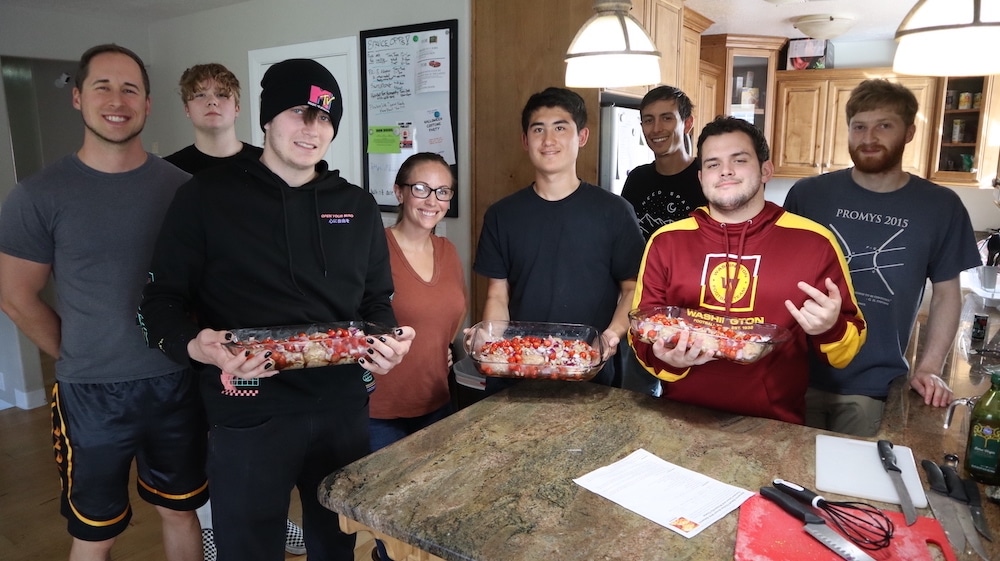A Comprehensive Guide to Failure to Launch Programs
We specialize in helping young adults live a independent and meaningful life by showing them how they can attend college, volunteer, get a job, work out, and other recreational activities.
What Are Failure to Launch Programs?
Failure to Launch programs offer life-changing support through proven methods and expert guidance. These programs blend therapy sessions, skill training, and mental health support to help young adults break free from stuck patterns and build confidence.

Educate

Experience

Empower
Ask Us How We Would Implement These Steps With Your Child
In-Depth look at Failure to Launch Programs
Defining Failure to Launch Syndrome
The failure-to-launch phenomenon describes young adults who struggle to reach important life milestones. These adults struggle with basic self-management, social skills and emotional regulation. They tend to stay at home until well after their mid-twenties and demonstrate little ambition to launch careers or grow up and move out.
Mental health concerns like anxiety, depression or high-functioning autism contribute significantly to this cycle. These challenges can be exacerbated by social pressure and family dynamics.
Young people with failure to launch require specialized support to help them develop life skills and confidence. They struggle with executive functioning and poor stress management.
Some suffer from issues of substance abuse or attachment that limit their potential. In what seem to be harmless or well-intentioned, parents may inadvertently coddle dependent behaviors. The good news? Therapeutic methods such as cognitive behavioral therapy can help to break this cycle.
When you build resilience and coping skills, opportunity knocks. Family therapy improves communication between parents and adult children caught in this dynamic.
What a Typical Program Looks Like
When a young adult lacks independent living skills, failure to launch programs provide full support. This can come in the form of a combination of mental health support, life skills training, and educational guidance.
For example, a standard program lasts from 6 to 12 months and comprises daily therapy, group activities and hands-on learning experiences. Participants engage with therapists, counselors and life coaches who address issues including anxiety, depression and social challenges.
And each program offers a clear way forward with skill-building, emotional support and practical training. Students learn the basics of managing life cooking, budgeting, job hunting.
The programs use cognitive behavioral therapy and mindfulness practices to build self-worth and emotional stability. They also introduce critical social skills and help young adults develop healthy friendships.
Family therapy helps fix relationships with family members and builds better communication at home.

Therapy and Mental Health Support in Launch Programs
Diagnostic Assessment and Personalized Care
Any failure to launch program begins with assessment and diagnosis. In young adults, mental health professionals conduct psychological assessments to identify individual issues. These tests examine cognitive abilities, emotional patterns and daily living skills.
A complete neuropsychological evaluation helps determine if someone has a condition present, such as ADHD, anxiety or high-functioning autism.
The diagnostic process is multi-step and designed to develop an accurate picture of each individual’s needs. Clinical interviews, which capture information on sleep habits, social skills, family dynamics.
Medical professionals look for substance use disorders, or mood disorders like bipolar disorder. They also discuss how different styles of parenting and past experiences lead to current behaviors. This specialized method results in tailored treatment plans that focus on specific trouble spots.
Skill-Building Interventions
Skill-building forms the backbone of successful failure to launch programs. These programs teach vital life abilities through hands-on practice and expert guidance.
- Practical living skills classes teach young adults how to handle everyday activities such as cooking, cleaning and personal hygiene. Students do these skills in the field so they are confident.
- Financial literacy includes everything from budgeting basics, banks and banking, and wise spending. Practical exercises teach participants how to track expenses and save money.
- Social skills development is about communicating, body language and having healthy relationships. One of the aspects of role-play is focusing on when to cancel our plans, if it comes to a point we can’t do it.
- This is if you are in September year one and moving to September year two, you want to plan for a deadline within year two. Students use planners and apps to plan their day.
- Working with a partner to create a curriculum of job readiness training, such as resume writing, interview practice, and workplace etiquette. Mock interviews provide the practical experience in team settings.
- Stress management practices using breath control have been you-know-what for a long time ~ the only way to release anxiety through anger. Cognitive behavioral therapy approaches teach students coping strategies.
- That trains you in skills like decision-making and critical thinking. Students must practice solving problems on their own using real-world situations.
- Training in all things tech includes basic computer skills, online safety and more. Digital tools for work and day-to-day tasks are part of student learning.
- Education in health and wellness involves nutrition, exercise, and sleep hygiene. Participants make individualized wellness plans to follow at home.
- Study skills and academic support help students succeed in school. Improve academic success using strategies like note-taking, research and preparation for tests.
Counseling and Mental Health Support
Mental health support forms a crucial part of failure to launch programs. Professional counseling helps young adults deal with their emotional blocks and mental health challenges.
- Individual therapy focuses on treating specific problems such as anxiety, depression, and personality disorders using evidence-based techniques like cognitive-behavioral therapy.
- Group therapy provides a safe environment for peers to share stories, learn from one another and develop social skills.
- Regular mental health screenings are performed by licensed therapists to monitor progress and modify treatment plans if necessary.
- Twenty-four-hour crisis intervention services are still available to assist participants in addressing acute emotional or mental health issues.
- Family counseling sessions rebuild broken relationships and improve parent versus young adults’ communication skills.
- Training in mindfulness teaches participants to cope with stress, regulate emotions, and practice self-care from day to day.
- Some groups are aimed at specific difficulties such as substance use disorders, eating disorders or high-functioning autism.
- Workshops on mental health education cover common disorders, symptoms, and adaptive coping skills.
- Medication management services are available for participants who need psychiatric support in addition to the therapy.
- Confidence building is developed through experiential exercises and real life application that life skills coaching teaches.
- Trauma-focused therapy also addresses past experiences that could hinder progress by using exposure therapy techniques.
- Participants have regular check-ins with mental health professionals to help keep them on track with their treatment goals.
- Peer mentoring matches each participant with a graduate who models successful program completion.
Educational and Vocational Guidance
Educational and vocational guidance plays a vital role in failure to launch programs. These programs help young adults find their path through career planning and skill development.
- Career counselors meet with clients one-on-one to identify their strengths and align them with appropriate job opportunities.
- In helping to identify gaps in knowledge, skills assessments create focus in learning plans.
- Resume writing workshops help clients position themselves to prospective employers.
- Mock interviews help clients practice navigating tricky queries, building confidence.
- Job shadowing allows customers to tour actual work environments and hear about various careers firsthand.
- Vocational training programs—the kind that teach specific job skills that employers are looking for immediately.
- Study groups help clients wishing to graduate high school or begin college courses.
- Time management coaching, in particular, allows clients to balance work, school, and personal life.
- Classes on financial literacy cover budgeting and money management skills.
- Whether you’d like to improve your skills or learn something new, online learning platforms facilitate learning from home in a flexible manner.
- Internship programs offer hands-on experience in selected career fields.
- Networking Connects Clients To Local Businesses And Jobs
- By providing concrete next steps for education and career success, goal-setting sessions help participants map out their future path.
- Progress tracking tools measure growth and offer little wins here and there.
- Support groups enable clients to discuss what’s going well, and what’s not, with others who are on similar paths.
Family and Trauma Support
If you are a young adult facing such challenges, the role of family support can be critical in overcoming these issues. Parents and caregivers must have the right tools available to help guide children through challenging times. A robust array of family members, mental health professionals, and community partners form a safety net for people experiencing difficulties.
So many resources exist within communities that support recovery efforts. Support groups connect people with parallel experiences and mentorship programs teaches practical life skills. Participating in social activities and volunteer work builds confidence and lessens isolation.
Such programs are most effective when tailored to the needs and cultural background of each individual. The combination of family care and community support really helps to get lives back on track.
Benefits of Failure to Launch Programs
Mental health specialists point to several crucial elements that ensure failure to launch programs are successful. Cognitive-behavioral therapy (CBT) is the gold standard treatment for anxiety and self-deception patterns, say leading child psychiatrists.
Clinical specialists say young adults often require a combination of acceptance and commitment therapy (ACT) and exposure therapy to bolster their confidence.
Leading experts emphasize the connection between psychological disorders and launch issues. “Substance use disorders, high-functioning autism and specific learning disabilities create unique barriers,” they focus on how.
Mental health counselors say skills like practicing distress tolerance and self-compassion can help teens move beyond shame and fear. These insights inform current treatment efforts for both adolescents and young adults who find themselves stuck in launch patterns.
Failure to launch programs create positive changes in mental health and daily living skills. These programs help young adults with anxiety, PTSD, or substance use disorders move past their fears and build strong foundations for independent living.
Program Impact on Troubled Teens
Our generation is set on changing the world through mental health. Completing these programs enhances social skills and teaches individuals how to cope with fears.
Many of those whose conditions are either high-functioning autism or some specific learning disabilities find new ways to deal with quotidian challenges. To help build confidence, the programs use cognitive behavioral therapy and “life skills” training.
Those programs address such common problems as insomnia, substance use disorders and clinical anxiety directly. Participants are taught to deal with their emotions and establish healthy habits. Most young adults transition from stuckness in hopelessness to finding fresh inspiration for life.
They acquire tools for coping with emotional problems and can develop closer relationships with family members. Most critically, they learn how to survive as autonomous adults who can make their own decisions.
Wider Societal Benefits
Each program that succeeds or fails to launch is likely to effect ripples across communities. These programs turn young adults with anxiety, PTSD and substance use disorders into productive members of society.
Good mental health provision supports holistic healing which reduces undue burden on public healthcare systems. Fewer demands on social services and family resources and more independent young adults.
Specialized learning disabilities and child development programs create a more robust workforce. Many young adults finish these programs on their way from dependency to self-sufficiency.
They work in careers, contribute taxes and serve their communities. Shifting this burden creates continued positive economic growth while lessening the strain on public assistance programs. A cycle continues with many participants who go on to become mentors themselves.
Best Practices for Implementation
Developing a Successful Program
A failure to launch plan that gets results starts with goal setting and action planning. But programs also require strong leadership teams who can contribute both mental health and life skills training expertise. The staff provides training on working with young adults on the Aspergers spectrum or with social challenges.
It should have a combination of individual therapy, group work and practice sessions in the real world.
Strong programs implement a sequential daily framework to increase independence gradually. They provide hands-on training to teach life skills such as cooking and managing money. The program space should be both inviting and formal with separate areas for one-on-one and cohorts to meet.
This training regularly checks on progress, and is very responsive to how much progress each person is making so they can shift their program plan quickly. Twice-weekly staff meetings keep staff members informed about the needs of participants and potential improvements to the program.
Collaboration and Partnership Models
Partnerships are at the heart of all successful failure to launch programs. And local schools work with mental health centers to identify the early warning signs in young adults. Mental health professionals work alongside job coaches to develop comprehensive support systems.
These team approaches ensure that young people are equipped with life skills while receiving the emotional support they need.”
Vocational training centers partner with social service groups to provide job training in a real-world situation. They pool resources, staff, and expertise to help young adults get on with their lives.
Most of these programs will work with specialists on autism who understand the unique needs of people with Asperger’s syndrome. Combining these groups forms a safety net that can catch struggling young adults before they fall through the cracks.
Building on skills and confidence together with shared knowledge and collaborative efforts is the very focus here.
Monitoring and Evaluation
Tracking success in failure to launch programs needs clear methods and tools. Regular checks help programs stay on track and show real progress.
- Daily progress reports detail small victories and struggles for each participant
- Counselors check in weekly to measure growth in social skills and emotional health
- They have hands-on life skills assessments every month, including cooking, cleaning and managing money.
- Education and Job Hunting with Goal Achievement Charts
- From family feedback surveys you can see home relationships shifting
- Staff internally review program effectiveness with group sessions recorded on video
- Tracking of job placements and school enrollment rates
- Results are compared to program targets in quarterly reviews
- Mental health screenings to monitor progress in anxiety and depression
- This is an excerpt from the feature article for the Above the Fold newsletter.
- Independent Living Readiness Scores Assess Program Success Overall
- Time-management logs: Enhancing the daily routine
- Mastery tests for skills confirm the learning of new skills
- They measure changes in alliances parent-child relationships
- Automatically tracking how long someone has been in a job shows the success of job stability
Future Directions and Innovations
Technology will reshape how failure to launch programs help young adults with Asperger’s syndrome through virtual reality training and AI-powered coaching. New research points to better ways to mix online and in-person support, giving more people access to life-changing help.
Emerging Trends
Today’s new failure to launch programs include virtual support groups and therapy sessions. Digital tools help young adults reinforce social skills when they are in their comfort zones.
Mobile apps monitor daily goals and progress, while video calls link peers who endure similar challenges. Social media groups provide safe spaces in which we can share our experiences to build confidence.
Nowadays, many programs incorporate in-person meetings along with online check-ins to maintain the interest of participants.
Real-Life Experiences in Virtual Reality Platforms These controlled environments help the young adults with Asperger’s syndrome learn the topics they need most (like job interviews and social situations).
Digital calendars and task managers instill time management and organization. Smart home devices promote independence by providing regular reminders and routines. These technological tools help to make learning for the participants of the program less scary and more enjoyable.
Policy Recommendations
Strong policies can drive greater success for failure to launch programs nationwide. Local governments could create tax breaks for businesses that employ program graduates. Schools do require clear rules for flagging students who may need these services early on.
Insurance companies need to open coverage for more mental health services and life skills training.
State legislators should introduce legislation that funds further research into program effectiveness. Laws on this should set standards for program quality and staff. Improved data tracking systems should measure success rates and indicate where to grow.
Policy planning requires special attention on programs dealing with young adults with Asperger’s syndrome. Public-private partnerships might also be able to provide more job training and housing assistance for program participants.
Research and Development Opportunities
Young adults with independence issues need a dose of creativity. New studies should look at how digital tools and online support groups correlate with success among participants in failure to launch programs.
Brain science gives us some exciting avenues to explore why such difficulties are faced by some individuals. Modern tech can monitor progress and provide real-time feedback to clients and therapists.
Trained upon data up to October 2023, scientists researching how other cultures cope with grown kids living at home. These results could inform better approaches to helping people with Asperger’s syndrome progress toward independence.
Looking to social media may offer trends among young adults experiencing life transitions. Exposing new methods to small groups will lead to tougher programs down the line.
The Next Steps
Call At the Crossroads Now!
Failure to launch programs offer vital support to young adults who struggle with independence. These programs blend life skills training, mental health support, and career guidance to create paths toward self-reliance.
Success stories show how proper support helps participants gain confidence, build relationships, and find purpose in their lives. Mental health professionals and educators must step up to create more programs that meet the growing needs of young adults.
Your choice to support or start a program could change countless lives and strengthen our communities.
